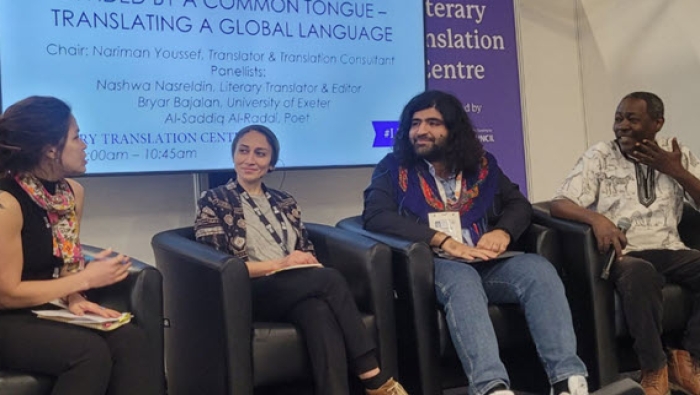
London Book Fair: Translation and Arabic as a ‘Global Language’

From left at the Translation Poetry Centre at London Book Fair are Nariman Youssef, Nashwa Nasreldin, Bryar Bajalan, and Al-Saddiq Al-Raddi. Image: Poetry Translation Centre
- Tuesday 9 May 2023
The Richness of Arab Language Poetry
ALondon Book Fair panel on Thursday (April 20) supported by the Poetry Translation Centre, brought together panelists who tackled the vast subject of the Arabic language—spoken by so many millions—and the challenges of translation.
For example, there are writings in vernacular as opposed to works in Modern Standard Arabic, or fus’ha.
Translator Nariman Youssef moderated the session called Divided by a Common Tongue: Translating a Global Language. It included:
Poet, editor, and translator Nashwa Nasreldin
Writer, translator, and filmmaker Bryar Bajalan
The Sudanese poet Al–Saddiq Al–Raddi
Youssef asked her panelists whether the many Arabic dialects—whether in Arabic literature or poetry—can be in competition with each other.
Bajalan said it’s important to remember that poetry is often chosen with biases and beliefs.
Arabic can be seen as a colonial language, for the Yazidis, for example, even though their poets write in Arabic. But “it’s a particular kind of Arabic,” said Bajalan. He added that Black Arab writers have been neglected as well, and that it’s important to pay attention to such voices.
As another example, he cited a book of poems, I Will Not Fold These Maps by Mona Kareem, a member of the Bidoon, a stateless community in Kuwait.
Nasreldin noted that Modern Standard Arabic is a formal language “not spoken by anyone really. Everyone speaks their various dialects.”
In the recent past, with Egypt being a locus of cinema and art, most people have become accustomed to Egyptian Arabic, but today, with the advent of satellite channels, there’s a “friendly competition” going on between local dialects.
There’s been lots of anxiety among poets about using fus’ha Arabic, Bajalan said. “Some writers with Kurdish backgrounds writing in Arabic were thought to speak a ‘weaker’ Arabic. But in Iraqi poetry,their dialects are so interesting, and it’s a way of bringing modern Arabic poetry to the fore because its freer to use the vernacular.”
‘A Living Language’
Vernacular Arabic is a living language, Youssef said, and Nasreldin added, “We don’t speak in fus’ha or live in fus’ha so when we write in it, we’re already translating.”
Nasreldin recounted how when she worked as a translator on the project Shatila Stories—a work of collaborative fiction with Syrian and Palestinian refugees living in the Shatila camp in Lebanon—only one contributor could write in standard Arabic.
“You’d never have gotten their stories,” Nasreldin said, “if you’d forced them to write in standard Arabic.

“The Palestinian dialect was sometimes very difficult for me, even though I’m familiar with many dialects. It opened my eyes that we’re missing out on so much [literature] because we’re not translating from these vernacular dialects. It’s very difficult for many people to be proficient in Modern Standard Arabic, because of who has access to education.”
‘Creative Art That Stands on Its Own’
In terms of what gets translated, and from where, there’s an imbalance, Youssef said.
“Publishers in the West are still biased and want stories that are making the headlines [or focused] on women’s emancipation [or stories], that are war-driven.
“I wish there was more of a focus on the creative art coming [from the Arab world], that stands on its own.”
Al-Saddiq Al-Raddi said he thinks of himself as a Sudanese poet rather than an Arabic-language poet. He has been living in the United Kingdom since 2012 when he was forced into exile from Sudan for political reasons.
He previously worked on a translation project in Sudan to foster social and political understanding. It brought together writers from South Sudan—where English is the official language—to collaborate with writers from northern Sudan who write in Arabic. As part of the program, they translated each other’s work.
Al-Saddiq, as he’s called, underlined the richness of Arabic language poetry from the East to the West of the Arabic-speaking territories, “despite such distinct histories. It’s important to amplify these voices from different parts of the world.”
And in defense of Modern Standard Arabic, “Isn’t it also wonderful,” Nasreldin said, “that Mona Kareem from the Bidoon community and Al–Saddiq can write in a language we can all understand, even if they’re from such different places?”
